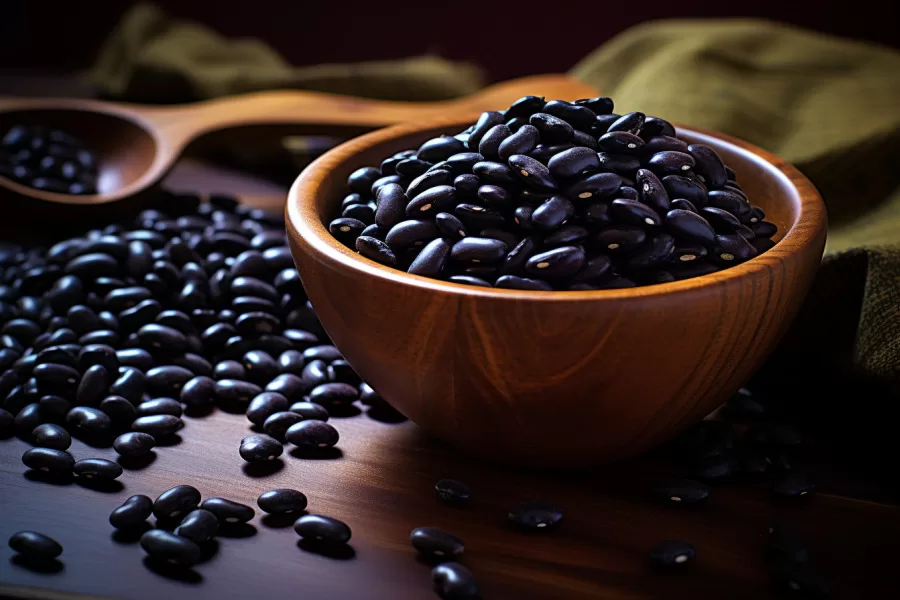Men’s heart health is a pivotal component of overall well-being, often influenced by lifestyle, dietary habits, and genetic predispositions. Adhering to a heart-healthy diet can substantially mitigate the risks of cardiovascular diseases, the primary killers globally.
Black beans emerge as a powerful superfood in promoting heart health, especially for men. They are loaded with essential nutrients, antioxidants, vitamins, and minerals that synergistically work to enhance cardiovascular functions and protect against heart ailments.
This article delves into the multifaceted benefits of black beans, highlighting their nutritional richness, impact on heart health, and practical ways to incorporate them into daily diets, all penned down in a conversational, engaging manner.
Nutritional Profile of Black Beans
Black beans are nutritional powerhouses, boasting a rich profile of vitamins and minerals, vital for optimal health. They are excellent sources of folate, magnesium, potassium, and iron, crucial elements in maintaining heart health.
- Antioxidants: Combat oxidative stress, protecting the heart from damage.
- Fiber: Facilitates digestion, lowers cholesterol levels, and maintains blood sugar balance.
- Protein: Essential for repairing tissues and maintaining muscle mass.
Benefits of Black Beans for Heart Health
Incorporating black beans into your diet can have profound impacts on heart health, attributed to their dense nutritional content. Here’s how:
- Lowering Blood Pressure: The high potassium and magnesium content help in relaxing the blood vessels, reducing blood pressure, a crucial factor for heart health.
- Reducing Cholesterol Levels: The rich fiber content in black beans plays a pivotal role in lowering bad cholesterol levels, thus preventing plaque build-up in the arteries.
- Managing Diabetes: The low glycemic index and high fiber content help in maintaining blood sugar levels, crucial for those with diabetes, a condition often linked with heart diseases.
- Improving Digestive Health: The fiber in black beans promotes healthy digestion and prevents constipation.
- Weight Management: The protein and fiber content in black beans aid in weight management, a key factor in maintaining heart health.
How to Include Black Beans in Diet
Integrating black beans into your meals is straightforward and versatile. They can be added to various dishes, enhancing flavor and nutritional value.
- Include them in salads for a protein boost.
- Make black bean soups or stews for a hearty meal.
- Use them as a filling in tacos or burritos.
- Create black bean burgers for a healthy alternative.
Risks and Considerations
While black beans are generally safe and healthy, some considerations and potential risks should be kept in mind, such as allergies and intolerances. Overconsumption can lead to digestive issues due to their high fiber content. Moderation is key.
Natural Products and Vitamins for Heart Health
Apart from black beans, several natural products and vitamins can bolster heart health.
- Omega-3 Fatty Acids: Found in fatty fish, flaxseeds, and walnuts, they reduce inflammation and lower blood pressure.
- Green Tea: Rich in antioxidants, it lowers cholesterol and improves heart function.
- Vitamin D: Obtained from sunlight, fortified foods, and supplements, it plays a crucial role in maintaining heart health.
Conclusion
Black beans are a nutrient-dense food, contributing significantly to men’s heart health by lowering blood pressure, reducing cholesterol levels, managing diabetes, and improving digestive health. Incorporating them into a balanced diet, along with other natural products and vitamins, can lead to a healthier, heart-happy life.
FAQs
Can black beans be included in a daily diet?
Yes, they can be included daily in moderation due to their high nutritional value.
Are canned black beans as nutritious as dried black beans?
Yes, though it’s important to choose low sodium options and rinse them thoroughly.
Can black beans cause digestive issues?
Yes, in some people, excessive consumption can cause gas and bloating due to their high fiber content.
